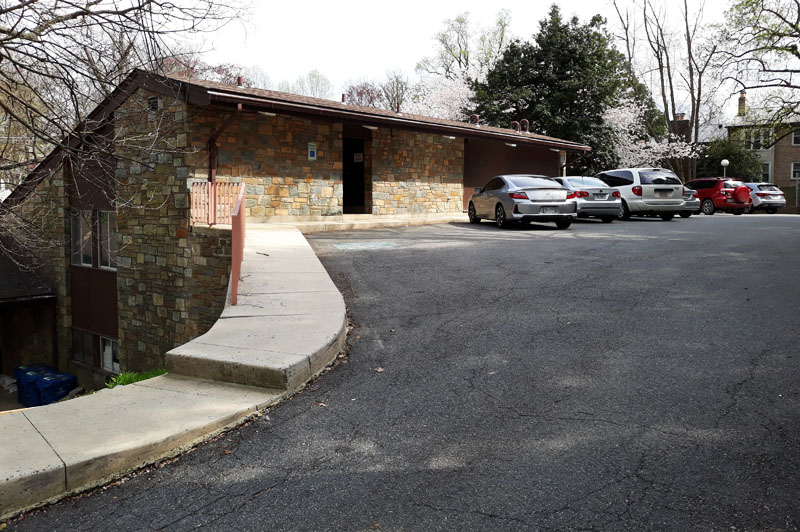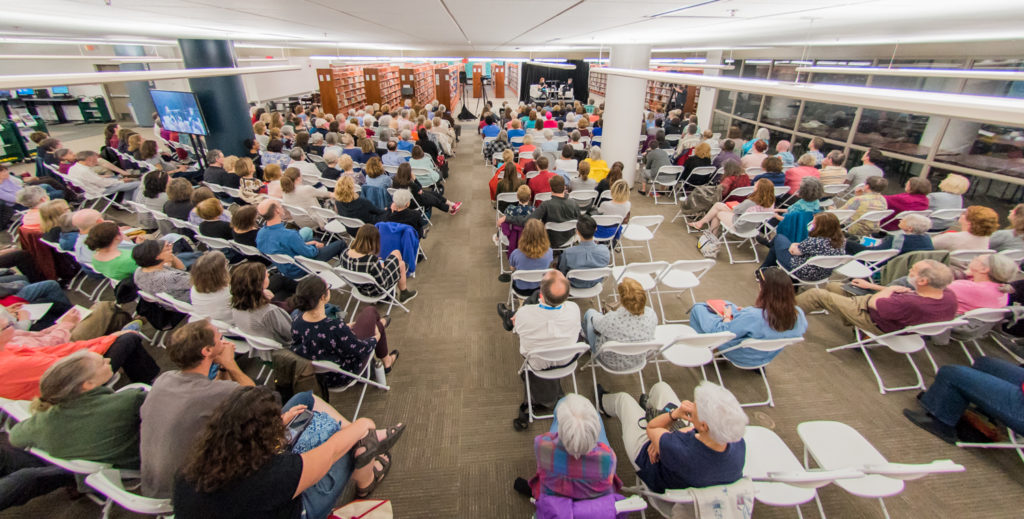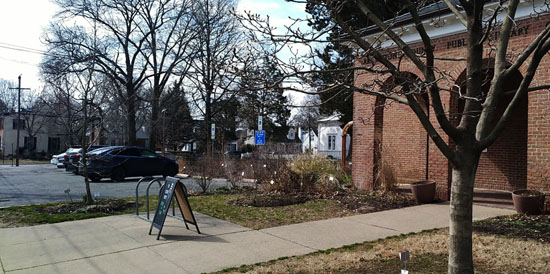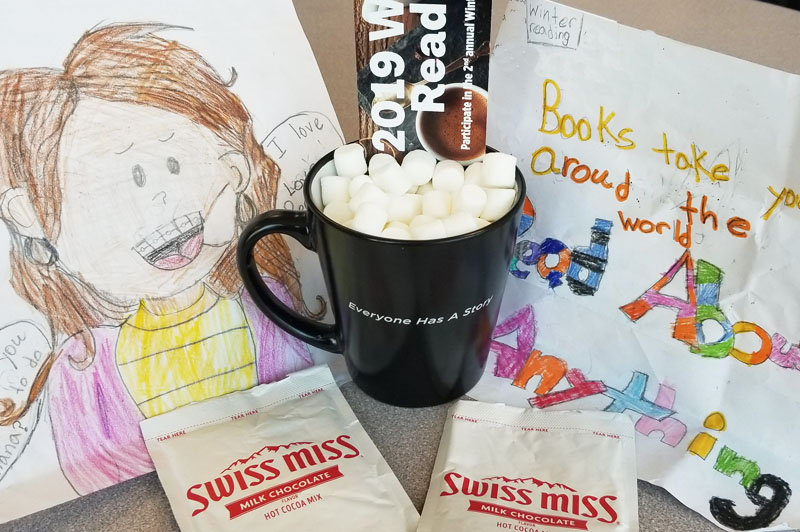The Cherrydale Branch Library parking lot will be closed for re-striping on Tuesday, April 9.
We apologize for any inconvenience this will cause. Street access and street parking to the Library will not be affected.

The Cherrydale Branch Library parking lot will be closed for re-striping on Tuesday, April 9.
We apologize for any inconvenience this will cause. Street access and street parking to the Library will not be affected.

On Monday, April 22, we hosted journalist Susan Orlean, author of "The Library Book," for Arlington Reads 2019.
Susan Orlean described learning about the 1986 LA Public Library fire during a visit to the library. Her guide took a big sniff of a library book and said, "You can still smell the smoke." She had never heard about the fire, but she immediately knew someone should write about it.

It turned out that person was her, and that book became "The Library Book." You can watch the video of Susan Orlean's Arlington Reads 2019 talk on youtube.
And if you're on hold to read "The Library Book," we recommend these six great nonfiction books while you wait.
All photos by Josh Brick, who holds the copyright.
Now you can make a suggestion for the Library collection, from inside your Library account. You can also track the status of your suggestions from a handy dashboard.
It is our goal to respond to every request placed through the form within 5 business days. Due to the volume of suggestions, that may not always be possible.
The Library welcomes suggestions for new materials, and purchases items recommended by patrons whenever possible. Individual purchase decisions will be guided by the Library's selection policy and availability of funds.
Log into your Library account and click on Materials Request in the left sidebar. A valid Arlington library card is required.
Guidelines:
Log into your Library account and click on Materials Request in the left sidebar.
View your requests:
The Glencarlyn Branch Library parking lot will close for repaving from 5 p.m. on Saturday, March 30, through 12 p.m. on Tuesday, April 2.
We apologize for the inconvenience this will cause to patrons.
Access to the Library will not be affected, and street parking will continue to be available.

Recent elections have brought attention to both the value and disregard of the Black women’s vote. As we move toward the celebration of the centennial of the 19th amendment, granting women the right to vote, we take a look at the role of Black women as suffragists, activists, voters, and political leaders.
Join Gloria Browne-Marshall, JD, MA, Professor, John Jay College of Criminal Justice, along with moderator Krysta Jones, founder and CEO of Vote Lead Impact, Inc., as she discusses the power of Black women voters, and how we can leverage all voters to create better public policy for all.
Register for this event at: https://www.eventbrite.com/e/the-power-of-black-women-voters-tickets-52524283546
This event is presented in partnership with the Women’s Vote Centennial Initiative, Zeta Phi Beta Sorority, Inc., Nu Xi Zeta chapter, League of Women Voters of Arlington, and Virginia’s List.
Want to start gardening, but don’t have the right tools? Ready to tackle a big yard project, and need something unusual?
The Shed, our garden tool lending library, opens Saturday, March 23 for the gardening season!
The Shed is open to Arlington residents and property owners, age 18+, with a Library card.
View a list of tools, the rules of use, and our registration and waiver forms on the Library website.
Over 250 people came together to celebrate Winter Reading on Saturday, March 9.

We made crafts and played games, ate snacks and drank hot chocolate -and everyone got a mug to take home!
How many people read together this winter?
Congratulations to everyone who read all those books - you did a great job!
The winner of the Winter Reading grand prize is Paul Cassidy.
Updated Monday, April 1
Lynda.com service has been fully restored.
(This is not an April Fools Day joke.)
The Library’s subscription to Lynda.com will be temporarily unavailable starting Tuesday, March 19.
If you are currently using Lynda.com to work on a course, we hope that this message allows you enough time to finish before Tuesday.
We expect that service will be restored as soon as possible, and apologize for the inconvenience.
On January 26, 1938, Zitkála-Šá, life-long advocate for Native American rights and a resident of 261 North Barton Street in Lyon Park, died at age 61. She was buried under the name Gertrude Simmons Bonnin, in Arlington National Cemetery.
A nationally recognized Native American author and activist, Zitkála-Šá was a vocal proponent for citizenship rights for Native Americans. Born in South Dakota into a Yankton Dakota Sioux family, she thrived on the Yankton Indian Reservation until Quaker missionaries recruited some of the reservation’s children to attend a Quaker manual labor school where she was given the Christian name Gertrude Simmons. Although she enjoyed learning to read and write, she experienced first-hand the damage of having her heritage stripped away. Feeling torn between her life on the reservation and her forced assimilation into white mainstream culture, Zitkála-Šá pursued higher education and distinguished herself as a public speaker on social and political issues.
“Folded hands lie in my lap, for the time forgot. My heart and I lie small upon the earth like a grain of throbbing sand. Drifting clouds and tinkling waters, together with the warmth of a genial summer day, bespeak with eloquence the loving Mystery round about us.”
"Why I Am A Pagan," Atlantic Monthly, Volume 90, 1902
Her largely autobiographical work on indigenous life was published by the Atlantic Monthly and Harper’s Monthly, including “Impressions of an Indian Childhood” and “The Trial Path” among many more. She collected tribal stories and legends into collections, and authored poems examining the intersection of nature, Native American life, and mainstream white American life.
In 1910, she began a collaboration with composer William F. Hanson, and the subsequent “The Sun Dance Opera” was the first opera authored by a Native American (under the name Gertrude Simmons).
“It was next to impossible to leave the iron routine after the civilizing machine had once begun its day's buzzing; and as it was inbred in me to suffer in silence rather than to appeal to the ears of one whose open eyes could not see my pain, I have many times trudged in the day's harness heavy-footed, like a dumb sick brute.”
"The School Days of an Indian Girl," Atlantic Monthly, Volume 85, 1900
As a member of the Society of American Indians, Gertrude Simmons (the name she used in records and public affairs) lectured nationally and lobbied for citizenship rights for Native Americans who were not naturalized U.S. citizens by birth but could apply through pathways such as military service, renouncing tribal affiliations, or accepting land allotments. As a previous clerk for the Bureau of Indian Affairs, she criticized the bureau for its mistreatment of Indigenous children placed in national education systems that forced assimilation and Christian values.
In 1916, her husband, Captain Raymond Talefase Bonnin (also of Yankton descent), lost his position at the Bureau of Indian Affairs in Utah and they moved to Washington D.C. where, as editor of the Society of American Indian’s publication American Indian Magazine, Gertrude Simmons Bonnin wrote about and exhibited treatises on many controversial issues. In 1923, she co-authored “Oklahoma’s Poor Rich Indians: An Orgy of Graft and Exploitation of the Five Civilized Tribe, Legalized Robbery” which discussed theft and murder by corporations seeking access to Native American-owned oil-rich lands. The article is credited with influencing the development of the Indian Reorganization Act of 1934, which returned government and land management to Native Americans.
On November 3, 1925, Gertrude and Raymond Bonnin purchased the stone bungalow at 261 North Barton Street in Arlington. from the first owners, Loyd and Bernice Claire. The Claires had built the house only one year earlier, having bought it from the well-known Lyon & Fitch real estate development. The Lyon & Fitch real estate team sold the Lyon Park subdivision properties with deed restrictions and covenants, including one preventing the property from being sold or rented to non-whites for a period of 99 years. The census recognized people of Native American ancestry as white and therefore the Bonnins were not prevented from purchasing the property.
In 1924, the Indian Citizenship Act granted citizenship to all Native Americans, but did not automatically afford voting rights. In response, Gertrude Simmons Bonnin co-founded and presided over the National Council of American Indians to unify First Nations in the movement to gain voting rights, healthcare, legal standing, and land rights. She also created the Indian Welfare Committee of the General Federation of Women’s Clubs, speaking often in Washington, Arlington, and Fairfax.
Gertrude Simmons Bonnin spent the remainder of her life in Arlington as president of the Council of American Indians, speaking and writing about the continuing political and social mistreatment of Native Americans. After her death, her husband continued to live in their home until his death in 1942 when the property was left in trust to their grandchildren.
United States of America, Bureau of the Census. Fifteenth Census of the United States, 1930. Washington, D.C.: National Archives and Records Administration, 1930. T626, 2,667 rolls.
Arlington County Land Records Office, various deeds pertaining to Gertrude S. Bonnin and R.T. Bonnin: Deed Book 609, p. 237, book 319, p. 64, and book 174, p. 152.
Zitkála-Šá, “The School Days of an Indian Girl”, Atlantic Monthly, Volume 85, 1900.
Zitkála-Šá, “Why I Am A Pagan”, Atlantic Monthly, Volume 90, 1902.
Lewandowski, Tadeusz. Red Bird, Red Power: The Life and Legacy of Zitkala-Ša, Norman: University of Oklahoma Press, 2016. (Available from the Library)
Susag, Dorothea M., Zitkala-Sa (Gertrude Simmons Bonnin): A Power(full) Literary Voice, Studies in American Indian Literatures, University of Nebraska Press, Series 2, Vol. 5, No. 4 (Winter 1993), pp. 3-24.
Tsjeng, Zing, Forgotten Women: The Leaders. London: Cassell Illustrated, 2018. (Available from the Library)
Capaldi, Gina. Red Bird Sings: the Story of Zitkala-̈Sa, Native American Author, Musician, and Activist, Carolrhoda Books, 2011. (Available from the Library)
"Preservation Today: Rediscovering Arlington" is a partnership between the Arlington Public Library and the Arlington County Historic Preservation Program.
Preservation Today: Rediscovering Arlington
Stories from Arlington’s Historic Preservation Program
Arlington’s heritage is a diverse fabric, where people, places, and moments are knitted together into the physical and social landscape of the County.
Arlington County’s Historic Preservation Program is dedicated to protecting this heritage and inspiring placemaking by uncovering and recognizing all these elements in Arlington’s history.
To learn more about historic sites in Arlington, visit the Arlington County Historic Preservation Program.

Ellen Bozman is an important name in Arlington County. As the longest serving member of the Arlington County Board to date, Bozman supported countless causes that have made long lasting impacts on the county and Northern Virginia.
Born and raised in Illinois, Bozman came to Arlington after graduating from Northwestern University. She began her public service in Arlington with the League of Women Voters and served on other boards and committees until her run for County Board in 1974. During her time on the Board, Bozman saw significant changes in Arlington - its development, transportation, and citizens were very different when she retired in 1997 than they had been when she began 23 years earlier.
In this oral history clip, Bozman shares with interviews Edmund Campbell and Cas Cocklin her experiences working on other boards and committees before her first run as a Democrat-backed Independent candidate for the County Board:
NARRATOR: Ellen Bozman
INTERVIEWER 1: Edmund Campbell
INTERVIEWER 2: Cas Cocklin
DATE: May 15, 1987
EC: You ultimately became President of the League, did you?
EB: Yes. Those were busy years for the League and I was President from '63 to '65. Then, as you know, once you have been president of an organization, there's no readymade spot for you so you look around and you tend to do other things. Then I later chaired the Health and Welfare Council of Arlington and the Committee of One Hundred and finally in the early '70's chaired the Rock Springs Congregational Church Council. About that time, some of my friends jokingly said well since you've done a church council, you're ready to run for the Board.
CC: Had you ever given any thought prior to that to getting into politics?
EB: Only recently prior to that. And the change really came about when I served on the Planning Commission. Up until the time I served on the Planning Commission, I didn't think that, first of all, I thought of myself as an administrator rather than a politician. Secondly, I had been through some, I had been standing on the fringes and involved in some very, very tumultuous political times in Arlington.
EC: Such as?
EB: Well, when you go way back and I remember Barbara Riches who was on the School Board saying to me, "I don't care when they throw garbage on my front porch because I know they don't have anything more important they're doing." Very split community. Very difficult and personal political campaigns. A kind of atmosphere that I didn't think that I was ready or wanted to participate in. But times change.
To learn more about Ellen Bozman;s life and work, visit the Center for Local History's online exhibit, Women's Work.
The goal of the Arlington Voices project is to showcase the Center for Local History’s oral history collection in a publicly accessible and shareable way.
What is the oral history collection?
Oral history is a popular method of research used for understanding historical events, actors, and movements from the point of view of people’s personal experiences.
The Arlington Public Library began collecting oral histories of long-time residents in the 1970s, and since then the scope of the collection has expanded to capture the diverse voices of Arlington’s community. In 2016, staff members and volunteers recorded many additional hours of interviews, building the collection to 575 catalogued oral histories.
To browse our list of narrators indexed by interview subject, check out our community archive. To read a full transcript of an interview, visit the Center for Local History located at Central Library.
We champion the power of stories, information and ideas.
We create space for culture and connection.
We embrace inclusion and diverse points of view.